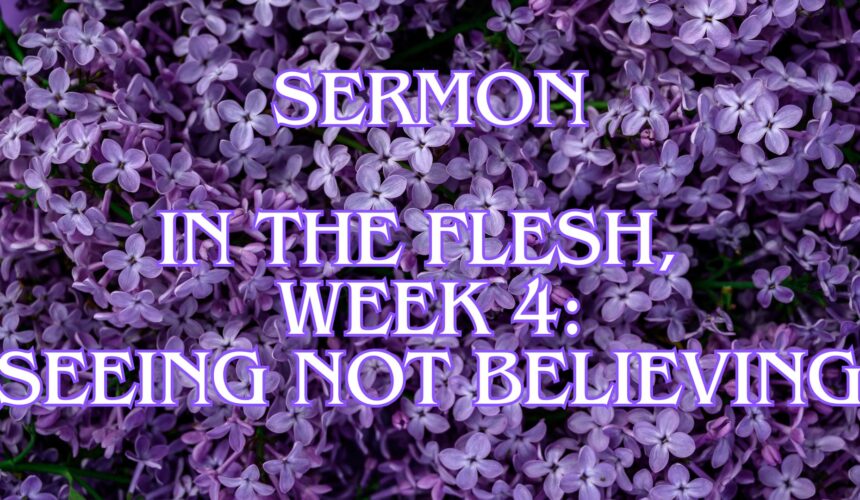4th Sunday in Lent
March 30, 2025
John 9:1 – 9
I have kind of a checkered history with dentists. When I was a kid, maybe eight or nine years old, I was running across an asphalt playground and this friend of mine tripped me, because we were nine-year-old boys and when I was a kid that was how nine-year-old boys expressed affection for each other. (I think.)
I’ve never been the most coordinated individual in the world, so I absorbed the impact of the fall with my face, because for some reason it was just a little too much for me to get a hand down in front of me before I hit the ground. (Like I said: not a star athlete.) So when I smacked my face into the pavement one of my front teeth broke off, and as luck would have it that was one of my permanent teeth that had just come in.
Nowadays, I understand they have much better ways of dealing with this sort of thing. But 53 years ago or whatever it was, I just had to live with a broken tooth for a couple years until my mouth grew and things sort of shifted into place – at which point I had a series of really unpleasant visits to the dentist. This soured me on dentists for quite a while.
In my mid-twenties, I moved to Boulder and after a few years started my coursework at the Iliff School of theology. I realized that even though I didn’t like dentists a whole lot, I couldn’t just never go see one. So I asked around and several people recommended the same guy, who just happened to be less than a mile from where I was living. So I grudgingly went to his office for a cleaning or whatever it was. When he learned that I was in school to become a Pastor, he was really excited, because he was a very committed, very passionate, and very fundamentalist Christian. (I guess the reputation of Iliff had not yet reached him.) So every time I went to see him, he would launch into a discussion of scripture, which swiftly became a whole set of theological arguments, which he almost always won because my face was numb from Novocain and his hands were in my mouth. It turns out it’s really hard to win a technical argument about the Bible or theology when you’re restricted to using only vowels.
But despite our spiritual differences, or maybe because of them, we kind of became friends. I soon realized that my fundamentalist dentist was a wonderful guy. He was kind. He was funny. He was genuinely interested in other people’s lives and what they thought. He loved hearing about what I was learning at Iliff, even though he disagreed intensely with most of it.
In the end, my dentist helped me get over my distaste for two things. One of them, of course, was dentistry. He helped me realize that my childhood experience wasn’t the way things had to be. The second thing about which he helped me shed my prejudice was fundamentalism.
Those of you who’ve been here during my time as Pastor, you know: I’m not a fundamentalist. I never have been. I have never believed, for example, that everything written in scripture is literally true. I don’t even think that question makes any sense. For me the real question is: can God use what is in scripture, can God use the songs, the poetry, the history, the stories, the imagery, the wisdom, the beauty, the holiness of these ancient texts, that have shaped and formed so many, to empty us of our ego, to shape and form us into people through whom the light of Christ shines for others? That’s the question. Whether it’s literally true that the prophet Jonah was swallowed by a great fish and spent three days in its belly before being vomited out on dry land? I don’t know. Honestly, I don’t even care. Now, my dentist did. He cared deeply about stuff like that, which always mystified me. But over time, it became clear that my prejudice against fundamentalists, my belief that God could not work through somebody who believed as he did, was just wrong. He loved God. He loved scripture. And scripture, whether inerrant or not, inspired him to love others. Through our friendship or acquaintance or doctor-patient relationship or whatever it was, my understanding of God and how God works in people’s lives was deepened and expanded.
Today is the fourth week in this Lenten sermon series I’m calling “In the Flesh.” I’m focusing on how we seek God and on some of the ways we might find God in this physical, material, enfleshed, beautiful, disappointing, often sad and painful world of ours – that can sometimes feel like it’s purposely designed to distract us from God. We can’t all be monks, taking on a life of prayer. And even monks – or maybe I should say especially monks – discover, just like the rest of us, that the real distractions from God are not in the outside world. We carry them within us. So how do we seek God, and where do we find God, when our unquiet spirits and our unquiet world make it seem like God can’t even get a word in edgewise?
Last week, I talked about how God can speak to us unexpectedly, in what a teacher of mine called the moments between – how sometimes it takes vigilance and patience, the willingness to let God do what God does in God’s own time, to recognize God in the crying baby needing to be held and changed, or the fig tree that won’t produce, just as much as in the quiet prayer time or the beauty of sunrise.
I also talked a little last week about the story we heard this morning from John’s Gospel. Like I said then, it’s one of two places in scripture where Jesus rejects the idea that suffering is God’s punishment for sin. I just don’t believe that, and I don’t think Jesus did either.
In this story, Jesus and his disciples encounter a man who’s been blind his whole life; he was born that way. Now in first century Judaism, or at least in some versions of it, suffering was commonly believed to be God’s punishment for sin. And if you believe that, a person who is born blind poses a tough theological question. What’s this guy being punished for? Did he sin before he was born? Or maybe it was his parents who did something to anger God. That’s the question that Jesus’ followers ask him. Jesus replies, “neither this man nor his parents sinned.” He’s saying, that’s not how this works. God doesn’t do that. Then he says, “he was born blind so that God’s glory might be revealed in him.” And he heals the man: he gives him sight for the first time in his life.
In many ways, I find this a beautiful and reassuring story. It tells us that when bad things happen to us, it’s not because God is mad at us. We’re not being punished for sin, even if sometimes it can feel that way. We don’t have to live in mortal fear of God’s power, knowing that we fall short of perfection and expecting the worst. It’s comforting, and in that way it makes me admire Jesus all the more, knowing that he opposed ideas and doctrines that kept people from loving relationship with God and with others.
And yet…
And yet…
At least on a surface level I find Jesus’ words almost as disturbing as the notion that blindness might have been punishment for sin. Jesus says, “he was born blind so God’s glory might be revealed in him.” One way of understanding that statement might be that God caused this poor guy to be born blind, to spend his whole childhood and adult life blind, unable to play with sighted children when he was young, unable to make a living when he grew up, unable to take his place in society like sighted people, all just so one day Jesus could walk by and heal him and everyone could be impressed. I’ve been thinking about this a lot over the past few weeks, because that doesn’t make sense to me. Just like God doesn’t punish people for sinning, I don’t think God would make people suffer needlessly just to impress us later. And I actually do believe there’s more here than first meets the eye.
I think one of the keys to understanding what’s happening in this story comes a few verses later. As soon as the man is healed, an argument starts among the religious leaders and the people of the town about whether the man was really healed, and if so who healed him. Some believe that the man has been healed, but others don’t. Some think Jesus healed him, others think Jesus couldn’t possibly be the one who did. And what fascinates me is that apparently some of the people who refuse to believe the blind man’s healing have a rational explanation. The whole thing, they say, is a trick. It’s not the same guy, just somebody who kind of looks like him. It’s designed to fool us.
What’s weird about that is this guy was born in their town. He’s lived there his whole life. Later in the story, the religious leaders go to his parents to ask about the miracle. His parents say, “he is of age. Go ask him.” That means the formerly blind man is an adult. People in that small town have been walking past him, seeing him begging on the street for years. But even so, some of them still can’t bring themselves to believe that the sighted man in front of them is the same guy. Maybe that’s because in all those years, they’ve never really seen him. Maybe they’ve never been able to see past his disability, his begging, his poverty, and know him for who he is.
I think this story raises a question that’s as relevant for us in the 21st century as it was for those who originally heard it in the first: who’s blind? Who’s blind? Is it the man who was born without sight, but who is absolutely clear about who healed him? Or is it the religious authorities and the townspeople who can see with their eyes, but who can’t believe that this man standing right in front of them is the same person who’s been begging in their streets for decades?
Who’s blind? And who has seen the glory of God revealed?
Every day, every day people have been walking past a blind man on the street. But they haven’t really looked at him. They haven’t been able to see him for who he is. They haven’t been able to see the spark of God, the divine image that’s within him just as it is within all of us. God’s glory was right there. They just ignored it, and what’s really striking is that even after his healing their reaction doesn’t change. They still insist that God’s glory is not there. The healing didn’t happen. Nothing to see here.
What if God’s glory was being revealed in that man before Jesus ever passed by, just as it’s being revealed in each one of us if we take the time to see? It’s kind of like my fundamentalist dentist. I’m embarrassed to say it, but I went into that relationship with a contempt for his version of Christianity that was only thinly veiled if it was veiled at all. It took me a while to see God’s glory revealed in him. I didn’t roll my eyes physically when he started talking Bible, but I sure did internally. Nothing to see here, or so I thought.
Maybe it’s not just the poor man born blind. Maybe all of us were born so God’s glory might be revealed in us. In community, in healing, in compassionate action, in knowing one another, we come face to face with the image of God. That doesn’t take heroic spiritual practice or a life without distraction. It just takes the cultivation of awareness, the ability to recognize who we’re dealing with when deep calls to deep; when the depth of our being speaks to the depth of another’s.


